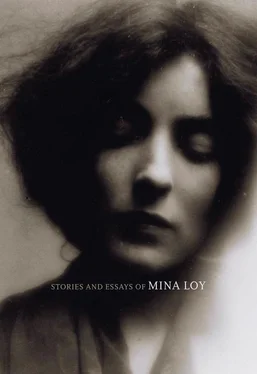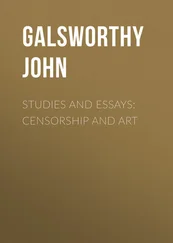Mina Loy - Stories and Essays of Mina Loy
Здесь есть возможность читать онлайн «Mina Loy - Stories and Essays of Mina Loy» весь текст электронной книги совершенно бесплатно (целиком полную версию без сокращений). В некоторых случаях можно слушать аудио, скачать через торрент в формате fb2 и присутствует краткое содержание. Год выпуска: 2011, Издательство: Dalkey Archive Press, Жанр: Современная проза, на английском языке. Описание произведения, (предисловие) а так же отзывы посетителей доступны на портале библиотеки ЛибКат.
- Название:Stories and Essays of Mina Loy
- Автор:
- Издательство:Dalkey Archive Press
- Жанр:
- Год:2011
- ISBN:нет данных
- Рейтинг книги:3 / 5. Голосов: 1
-
Избранное:Добавить в избранное
- Отзывы:
-
Ваша оценка:
- 60
- 1
- 2
- 3
- 4
- 5
Stories and Essays of Mina Loy: краткое содержание, описание и аннотация
Предлагаем к чтению аннотацию, описание, краткое содержание или предисловие (зависит от того, что написал сам автор книги «Stories and Essays of Mina Loy»). Если вы не нашли необходимую информацию о книге — напишите в комментариях, мы постараемся отыскать её.
Stories and Essays of Mina Loy
Stories and Essays of Mina Loy — читать онлайн бесплатно полную книгу (весь текст) целиком
Ниже представлен текст книги, разбитый по страницам. Система сохранения места последней прочитанной страницы, позволяет с удобством читать онлайн бесплатно книгу «Stories and Essays of Mina Loy», без необходимости каждый раз заново искать на чём Вы остановились. Поставьте закладку, и сможете в любой момент перейти на страницу, на которой закончили чтение.
Интервал:
Закладка:
“And criminals, you say, extraordinary.
“Er — What about his education?” she demanded irritably.
The parson looked her squarely in the eyes.
“The Lord will provide.”
“But criminals; impossible!”
“You forget,” he said, “To the Lord, all things are possible.”
“The responsibility,” she objected.
“The Influence,” he encouraged her.
“The Taint?”
“I am convinced, that some ancestor — ”
“Ah, an ancestor?” She brightened.
“Was one of us. We have here, a pure throw-back.”
“You think so?”
“I am convinced.”
“I shall consult a criminolo — — a specialist.”
“I only hope,” said the parson, pressing her hand, “He will understand this case.”
+
Mrs. Bates did not return however, for some time. She was worried.
“You mope,” said the new young doctor.
She told him of her loneliness, her love of youth around her. Piece by piece, he got the whole story of those innocent eyes.
“You fear, because the parents are criminals?”
“Yes.”
“But excuse me, with you the boy would, would he not, be amply provided for?”
“I don’t adopt by halves, I think I may say it would be — amply.”
“He would get a first-rate education and what is more important, plenty of amusement I suppose?”
“Ah,” sighed Mrs. Bates. “How I should love to hear him laugh.
“Of course as things are at present it is only fitting that he should remain a little too serious. But under other circumstances, — — —
I should discourage it.”
“Oh certainly.”
“The Parson thinks he has the vocation — — but I should hardly care — — a great fortune brings responsibilities, doctor. He would have to devote himself — —”
“Precisely. But what about— What does the boy want?”
“He wants,” said Mrs. Bates, “At present, to reform the world.”
“There’s scope for a career,” the doctor laughed. “— ways for spending your money which would hardly pass unnoticed. Should he make his attempt in good faith. He might after all land in prison.”
“But what a different landing.”
“Might influence the sentiment of the vote. Heard Debs got one million votes for presidency when he was in — ”
“But in America.”
“Well he could run a newspaper.”
“Dear man, it would cost him millions not to get bought up.”
“If he went in for it in good faith — ”
“He would fail.”
“They have,” said the doctor, “all failed.”
“I sometimes think great failure makes more fascinating men, than great success.”
“They have more time.”
“Such men understand women.”
“Ah, they understand each other.”
“It’s true we have the eternal disadvantage.”
“So ingeniously disguised.”
“I am sure doctor, you will do very well indeed here.
“So you really persuade me that such an experiment would not end in calamity?”
“Calamity — but not in that particular calamity you might expect.”
“Yet — criminals?”
“With what you have to offer him, who would ever dream of crime? And there is one rule in heredity, dear lady, that is invariable. The impulse of the child is towards the negation of the parent. You cannot tell me you have never noticed this? — — In yourself — ?”
“We never take for granted the things we prove. — — Yes, I am, I admit it, only charitable because I wished from the first to supersede my mother’s frivolity, my father’s gree — ”
The doctor reprovingly,
“He amassed a very great fortune, Mrs. Bates.”
“Why yes, one should only assess people at what they are worth.”
“Which has made the experiment you are about to make, possible for you.”
“Criminals.” She harped plaintively,
“He might, you know, inherit the desire — ”
“ ‘The desire’ is money. With that and an exaggeration of bad manners. The solution of the criminal may occur to you. There is no ‘criminology.’ ”
“But when ‘they’ have small heads and — — violate?”
“Ah, that’s a different thing — pathology.”
“Of course,” said Mrs. Bates. “These parents have not killed—”
“—and murder is merely bad temper, given a cranium of normal proportions.”
“Doctor you are a terrible man. What you must think of humanity! And yet you cure us.”
“There you have it. That is indeed, in many cases, criminal. See, we are not so terrible after all, we criminals. Good night— And don’t take things so scrupulously. There is only one duty, and it has never been done — ”
“You have made me feel so much brighter, doctor. It’s stopped raining? Good night!”
+
Mrs. Bates, reacting from the doctor’s philosophy, did consult a criminologist.
He was old, and the last bright patch had faded from his expectations.
He showed her charts. He shook his head.
He hoped for less than nothing of thieves’ progeny.
The exasperation, that being a plain woman she always felt when choosing a hat, kindled her.
She had chanced on one more beautiful thing she coveted. It seemed as usual unsuitable. Again she renounced the idea of adoption.
Only, the next time she visited the mission house, Hyde was singing in the choir. It was an unfair ordeal for her: they had put him in a surplice.
The sight was too reassuring.
She gave orders for the records to be searched for his forbears.
A sexton was discovered on the distaff side, and this she felt justified her in taking the risk.
The parson regretted having been perhaps over persuasive, for Hyde Park Hinderman passed altogether into the hands of Mrs. Bates, to be known henceforth as Hyde Bates.
+
When the ego detaches itself from its surroundings, it leaves those surroundings littered about, waiting to regain significance from a revaluation.
So much disorderly building material, so much unfashionable stuff from which to select something fitting for the construction of the visible edifice of a personality, from which to shape the circumstantial garments of the spirit.
To the sensibility of Jacky Sider feeling of the stuff of his surroundings, it asserted itself to a grimly gloomy drop-curtain to the theatre of his future. Which it was urgent that he should lift.
It was jagged and faded, disintegrated and cubistic, it hung over him, pressed upon him, knocked against him.
His entourage of the ragman’s shop fluttered dustily across his mind like a shredded fabric.
Rusted, twisted metals, battered rectangular inanimate — tables and chairs— The violated surface of the sawed-up corpses of trees, the denuded lewdness of pawned bed sheets: his father and mother counted them, fingered them, stacked them up with a sullen kind of joy. It appeared as if for them, these things were permits for the entrance to a shrine.
In the little back room where the clock ticked, there was a big bed and a candlestick of a youth and maiden under a big white china convolvulus dashed with gilt. In the back room there lingered in the day-time a certain volcanic peace.
Always after the day’s haggling, the man and woman went to bed as early as they could. Yet this was the only hour their movements did not drag. After the meal of sausage and lettuce, they drew in the trestles which lurched under their soiled treasures outside the shop, with a febrile despatch.
They became like people about to go to the theatre.
All day long Jack saw them as animals who had learned to count. Sometimes when his mother said softly
“C’mon Jim, I’ve seen to the shutters,” he saw them as angels, in the evening, on their way back to Heaven.
Читать дальшеИнтервал:
Закладка:
Похожие книги на «Stories and Essays of Mina Loy»
Представляем Вашему вниманию похожие книги на «Stories and Essays of Mina Loy» списком для выбора. Мы отобрали схожую по названию и смыслу литературу в надежде предоставить читателям больше вариантов отыскать новые, интересные, ещё непрочитанные произведения.
Обсуждение, отзывы о книге «Stories and Essays of Mina Loy» и просто собственные мнения читателей. Оставьте ваши комментарии, напишите, что Вы думаете о произведении, его смысле или главных героях. Укажите что конкретно понравилось, а что нет, и почему Вы так считаете.












